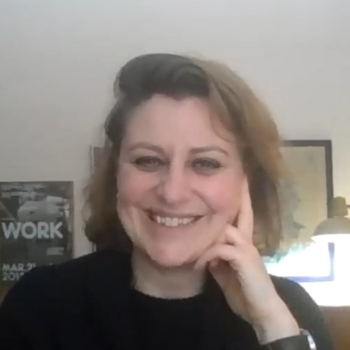
Over 300 households tuned in on 30 November to hear Dr Laura Schwartz give Humanists UK’s prestigious annual Holyoake Lecture, on ‘Infidel Feminism: Secularism and Women’s Rights Past and Present’.
Laura’s lecture was a deep-dive into the lesser-known history of women’s rights, and highlighted how humanist and secularist convictions shaped the lives and activism of prominent freethinking women of the late Victorian era. Many of these women, said Laura, challenged the constraints imposed on them by an overwhelmingly Christian and patriarchal society, motivating them to challenge the status-quo, and to campaign for equality against all odds.
Laura highlighted the work, lives, and legacies of a number of radical, iconoclastic, and freethinking women who helped to shape the early humanist movement. The secularist, socialist, and freethinker Harriet Law (1831-1897) for example, turned her exacting knowledge of the Bible into a withering criticism of Christianity, and edited the Secular Chronicle, which advanced her secularist and feminist ideas to the burgeoning secularist movement. Laura also highlighted the work of secularist Annie Besant (1847-1933), who abandoned the Christian teachings of her youth and campaigned for equal rights, birth control, and the working rights of women. These ideas were ‘truly outrageous’, said Laura, and the horror with which they were received can’t be overstated.
Moving from secularism of the past to that of the present, Laura touched upon how she was drawn into her research by her experiences campaigning against the US/UK invasion of Afghanistan and Iraq. She outlined how the war posed difficult questions for feminists. Secularism and women’s rights were being used rhetorically deployed as justification for Western imperialism, with President George Bush claiming that he wanted to bomb Afghanistan in order to ‘liberate’ Muslim women. At the same time, some Afghani feminist organisations, such as the Revolutionary Association of Women of Afghanistan, continue to insist on the utility of secularism as they oppose both Western imperialism and religious oppression.
Following a lively Q&A session, which covered a broad range of topics including supporting global grassroots feminist movements, men’s support for 19th century feminism, and how secularism and feminism are not (and need not be) synonymous. Laura was awarded Humanists UK’s prestigious Holyoake Lecture medal, for her research and work on the freethinking women of the early secular and humanist movements.
Notes
The Holyoake Lecture is held annually, and explores aspects of politics or a contemporary social or political issue, especially as it relates to secularist and humanist issues, including liberalism, democracy, social justice, feminism, anti-racism, LGBT rights, or equality. It is just one of the many events in the Humanists UK Annual Lecture series, which also includes the Darwin Day, Rosalind Franklin, Blackham, and Voltaire Lectures.
